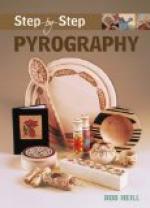The guests at the castle were all going to the wedding except Ranulph and the Norman knight. Ranulph expected to accompany King Henry to England, and Gualtier Giffard had to take a report from Count Thibaut to friends in Normandy, touching certain matters of state.
Then the Count was invited to a hastily arranged banquet in a town some leagues away, where various important persons were to be guests, among them Henry Plantagenet himself. The way to Montfaucon lying in the same direction, it was decided that Alazais and her bridesmaids should return to her home under escort of the Count and his friends. When the banquet was over and the conference between Henry and his vassals in Guienne was concluded, the wedding guests would assemble at Montfaucon.
Gossip about the banquet and the conference flew like tennis-balls among the guests. It was said that one of the matters discussed would be the claim of the deposed King of Leinster, Dermot MacMurragh, who was even now at the heels of the English King, trying to interest him in a possible Norman invasion of Ireland.
“I have seen this Dermot,” said de Marsan, “and a choice group of cut-throats he had collected about him. Garin de Biterres was one of them, by the way.”
“He was always over-fond of laying wagers,” yawned d’Acunha. “He is probably betting his head on this Irish wild-goose chase.”
“I will burn a candle,” said Bertrand d’Aiguerra, “to any god of luck who will send that caitiff where he gets himself killed. If he were not one of us he would not be such a nuisance. His mercenaries will be the ruin of us. The people were touchy enough before, but now they begin to think we are all birds of the same black feather.”
“He is only half Auvergnais,” objected Savaric. “The other half is Sicilian, I believe. A man cannot be half a gentleman, can he? I will admit that Biterres desires to live like a gentleman,—according to his own ideas of one. He has not been the same man since he was taken by the Moors. He was never honest, but that seemed to warp his nature as well as his body. He learned things that it does no man any good to know.”
“Let us hope that Saint Patrick will dispose of him for the good of his Irish,” remarked Enrique de Montfaucon. “They say that the Plantagenet will do no more than give letters patent to any Norman adventurer who takes up Dermot’s cause. I think he has his hands full with his own sons.”
Ranulph listened to this conversation with interest. The ill-famed leader of mercenaries had aspired to the hand of Lady Philippa while she was yet a child—and had been brusquely dismissed by her father. He lived now by hiring himself and his troops to any ruler who had a war on hand and would pay his price. In peaceful intervals they lived as they could.
The Count was talking to Gualtier Giffard about the Irish venture.
“If the Normans rule Ireland,” he observed, “your fortunes may improve. A grant of land there might be worth your while.”




